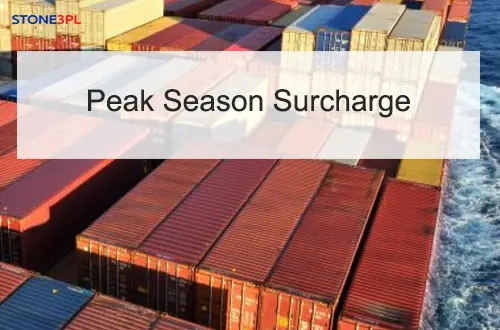Logistics Peak Season Surcharge: Strategies for Dealing with Logistics Peak
Are you still worried about the peak season surcharges that increase transportation costs and squeeze profit margins? Whenever the international transportation peak seasons such as holiday promotions, Black Friday, and Double Eleven are coming, many companies and sellers face a common challenge - international transportation peak season surcharges. Due to the reduced efficiency of the supply chain during the peak season, transportation delays may lead to insufficient inventory and affect market supply. Ultimately, delayed delivery of goods may damage customer trust and satisfaction. This article will deeply analyze the reasons behind the peak season surcharges, provide coping strategies, and ensure smooth logistics during the peak season.

What is the peak season surcharge?
The peak season surcharge, or PSS, is an additional fee charged by shipping companies during busy freight seasons. Due to the continued fluctuations in the global supply chain, air and sea freight capacity is limited, so shipping companies will add this additional fee on top of the original transportation costs. Peak season surcharges are usually added during the global freight peak season (usually between April and November). For companies that transport goods internationally, peak season surcharges can be a major pain point, often leading to unexpected budget overruns and delivery delays.
Main periods of peak season surcharges for international shipping:
Pre-holiday shopping season (e.g. Black Friday, Christmas)
Chinese New Year
Back to school season
Summer months on certain trade routes
Why are there peak season surcharges?
Surge in freight demand: During the global freight peak season, holiday shopping seasons, promotional activities in specific regions, etc. lead to a surge in demand for goods. Many businesses and sellers need to transport goods, resulting in a surge in demand for shipping and air transportation.
Tight transportation resources: Increased cargo volume may lead to insufficient space for shipping companies (such as ships, aircraft and containers), and limited capacity of airlines, resulting in a shortage of transportation resources.
Rising operating costs: Shipping companies need to adjust their operating networks to adapt to peak demand, which will increase operating costs.
Seasonal fluctuations: Peak demand for certain seasonal products, such as heating equipment in winter, cold drinks in summer, etc.
How to calculate peak season surcharges?
PSS is based on the weight or volume of the goods and varies depending on the origin and destination countries. The calculation method varies from shipping company to shipping company and route.
How does PSS affect your international shipping strategy?
Increased shipping costs
PSS can significantly increase your overall logistics expenses, which can affect profit margins.
Supply chain disruptions
Higher costs may force you to adjust order quantities or timing, which may result in out-of-stock or excess inventory.
Customer satisfaction
If the increased costs are passed on to customers, it may affect their purchasing decisions and loyalty.
In the field of international transportation, Peak Season Surcharge (PSS) is a topic of concern to many businesses and sellers. With the surge in market demand, rising shipping costs have become an inevitable reality. This article will delve into the causes and effects of peak season surcharges and how companies can effectively respond to this challenge and ultimately maximize cost-effectiveness.
What are the strategies for dealing with peak season surcharges?
Peak season surcharges are an inevitable part of international transportation, but with reasonable strategies and professional logistics services, companies can effectively control costs and keep the supply chain running smoothly.
- Plan transportation in advance
Seasonal forecasts, predict peak season times based on historical data and market trends. Be prepared to order in advance, book transportation resources in advance before the peak season arrives, and lock in prices.
- Optimize supply chain management
Diversify transportation methods, combine sea, air, land and other modes, and balance cost and efficiency. Set up safety inventory reasonably to avoid the risk of out-of-stock due to transportation delays.
- Use digital tools
Use logistics management systems to monitor the status of goods and transportation costs in real time. By analyzing transportation data, optimize transportation routes and methods to reduce unnecessary costs.
- Cooperate with logistics service providers
Choose an experienced logistics service provider, such as Stone3pl, and enjoy professional transportation solutions. You can also customize personalized logistics services according to corporate needs to reduce peak season transportation costs.
How does Stone3pl provide peak season logistics transportation assistance?
Don't let peak season surcharges undermine your international transportation strategy. At Stone3pl, we understand the complexity of international transportation and the challenges brought by peak season surcharges. Our expertise in logistics and fulfillment services ensures that your goods are handled efficiently and cost-effectively.
As your trusted international logistics partner, Stone3pl provides comprehensive logistics solutions to help you stay competitive during the peak season. If you are facing the challenge of peak season transportation or want to optimize your logistics cost structure, please contact Stone3pl. We will provide you with personalized logistics consulting and services to ensure that your cargo transportation is more efficient and economical.
